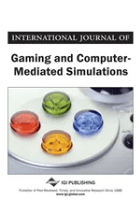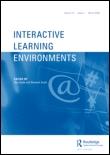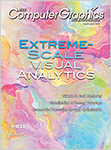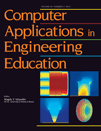
International Journal of Gaming and Computer-Mediated Simulations
Scope & Guideline
Igniting Conversations on Computer-Mediated Experiences
Introduction
Aims and Scopes
- Gaming and Simulation Technologies:
Research in this area explores the development and application of advanced gaming and simulation technologies, including virtual reality (VR), augmented reality (AR), and artificial intelligence (AI) to enhance user experiences and educational outcomes. - Educational Applications of Games:
The journal emphasizes the use of games and simulations in educational settings, investigating their effectiveness in promoting learning outcomes, engagement, and cognitive skills among diverse learner populations. - Health and Well-Being through Gaming:
This scope includes studies on how gaming and simulations can be used as therapeutic tools for mental health interventions, such as cognitive behavioral therapy applications and gamification for stress relief. - Data-Driven Approaches in Gaming:
Research that utilizes big data, machine learning, and deep learning techniques to analyze and improve gaming experiences, player behavior, and system performance. - Cultural and Social Dynamics in Gaming:
Investigations into how cultural differences, social interactions, and community dynamics influence gaming experiences and player motivation.
Trending and Emerging
- Integration of AI and Machine Learning:
Research focused on leveraging AI and machine learning techniques to enhance gaming experiences, predict user behavior, and optimize game design is increasingly prominent, showcasing the relevance of data-driven approaches in gaming. - Health-Centric Gaming Innovations:
The emergence of games designed for health interventions, such as mental health support and cognitive therapy, reflects a growing trend in applying gaming for therapeutic purposes, indicating its potential impact on public health. - Educational Gamification and Serious Games:
A significant increase in studies on gamification strategies and serious games aimed at educational contexts highlights a trend towards using interactive and engaging methods to facilitate learning. - Collaborative and Social Gaming Experiences:
Research on collaborative gaming experiences and their effects on social interaction and community building is gaining traction, indicating a growing interest in the social dimensions of gaming. - Sustainability and Environmental Awareness in Gaming:
Emerging studies focusing on sustainability themes in gaming, such as environmental education through gamified experiences, suggest a trend towards incorporating global issues into game design.
Declining or Waning
- Traditional Game Mechanics:
There seems to be a waning interest in research focused solely on traditional game mechanics without integration of modern technology, as more studies now emphasize immersive and interactive experiences. - Physical Gaming Environments:
Research centered on physical gaming environments has decreased, likely due to the rise of digital and virtual gaming platforms, which offer more versatile and accessible experiences. - Esports as a Standalone Topic:
While esports remain significant, the focus on them as a distinct area of study appears to be diminishing, with more emphasis now placed on integrating esports within broader gaming and educational contexts.
Similar Journals

Cyberpsychology Behavior and Social Networking
Advancing Insights into Online InteractionsCyberpsychology Behavior and Social Networking is a leading international journal dedicated to the exploration of the intricate relationship between psychology and digital interactions. Published by Mary Ann Liebert, Inc, this esteemed journal boasts a strong impact factor, reflecting its significance in the fields of psychology, communication, and computer science. With a broad scope encompassing topics such as social networking, online behavior, and human-computer interaction, the journal aims to provide a vital platform for researchers, professionals, and students to share innovative research and insights. Recognized as a Q1 journal across multiple categories, including Applied Psychology and Human-Computer Interaction, it ranks impressively among its peers, underscoring its influence in advancing academic discourse. Additionally, the journal offers open access options, enhancing the visibility and accessibility of published work to a diverse audience. As digital technologies continue to evolve, Cyberpsychology Behavior and Social Networking remains at the forefront, fostering scholarly dialogue that navigates the psychological ramifications of our increasingly interconnected digital lives.

INTERACTIVE LEARNING ENVIRONMENTS
Transforming education through technology-driven insights.INTERACTIVE LEARNING ENVIRONMENTS, published by Routledge Journals, Taylor & Francis Ltd, is a premier peer-reviewed journal that focuses on the intersection of technology and education, dedicated to advancing the understanding of interactive learning methodologies. With an impressive Q1 ranking in both Computer Science Applications and Education, as well as in E-learning, this journal stands out as an authoritative source of innovative research, ranking 28th in Education and 65th in Computer Science according to Scopus metrics. The journal's comprehensive scope covers a broad range of topics, from the effectiveness of haptic feedback in learning environments to the development of adaptive learning technologies, making it a vital resource for researchers, educators, and policy-makers alike. Although currently not an open-access publication, INTERACTIVE LEARNING ENVIRONMENTS provides readers with substantial insights and empirical findings critical for both theoretical and practical applications in the evolving landscape of educational technology.

IEEE COMPUTER GRAPHICS AND APPLICATIONS
Transforming Ideas into Visual RealityIEEE Computer Graphics and Applications is a premier journal published by the IEEE Computer Society, focusing on the rapidly evolving fields of computer graphics and computer-aided design. With an established history since 1981, this journal has become a vital platform for disseminating innovative research and applications that bridge theory and practice. It is indexed in Scopus, holding a respectable rank of #49 in Computer Graphics and Computer-Aided Design and #250 in Software, reflecting its significant contribution to the academic community with a notable 54th and 38th percentile, respectively. While it currently operates without open access options, the journal continues to provide valuable insights that cater to researchers, professionals, and students alike, striving to push the boundaries of technology and creativity. With plans to converge until 2024, IEEE Computer Graphics and Applications remains committed to fostering advancements in the discipline, making it an essential resource for those at the forefront of computer graphics innovation.

Frontiers in Computer Science
Pioneering open-access discoveries in diverse computer science fields.Frontiers in Computer Science is a premier open-access journal published by Frontiers Media SA that has rapidly established itself as a prominent platform for scholarly research in the diverse and evolving field of computer science. With a notable impact factor reflecting its high citation rates, this journal aims to disseminate innovative findings and groundbreaking studies across multiple subdisciplines, including Computer Science Applications, Computer Vision and Pattern Recognition, and Human-Computer Interaction. Since its inception in 2019, and with a consistent trajectory from 2019 to 2024, it has garnered accolades, achieving Q2 ranking in several categories and an impressive Q1 in miscellaneous areas of computer science. Researchers, professionals, and students alike are encouraged to contribute to this dynamic journal that serves as a vital resource for advancing knowledge and fostering collaborative dialogue in the global computer science community. Frontiers in Computer Science is committed to providing open access to research, promoting unrestricted sharing of ideas and fostering innovation at the intersection of technology and society.

Journal of Computers in Education
Advancing Knowledge at the Intersection of Tech and Teaching.The Journal of Computers in Education is a distinguished academic journal published by SPRINGER HEIDELBERG, dedicated to advancing the intersection of technology and pedagogy. With an ISSN of 2197-9987, this journal has established itself as a pivotal resource for researchers and educators alike since its inception in 2019, maintaining a strong focus on innovative applications of computer science within educational contexts. Ranked in the Q1 category in both Computer Science Applications and Education, the journal demonstrates a high impact in its field, holding a remarkable position within the top 1.5% of journals in social sciences (rank #20/1543) and top 5.5% in computer science applications (rank #45/817). The journal's scope encompasses a wide range of topics including but not limited to educational technologies, e-learning methodologies, and the effective integration of computers in teaching, making it an essential source for professionals and students who are keen to explore cutting-edge research and trends. Although access options vary, the journal's commitment to disseminating quality research continues to enrich the academic landscape in Germany and beyond, nurturing the synergies between education and technology.

Cyberpsychology-Journal of Psychosocial Research on Cyberspace
Transforming Understanding of Digital IdentitiesCyberpsychology - Journal of Psychosocial Research on Cyberspace, published by Masaryk University, Faculty of Social Studies, is a pioneering open-access journal dedicated to the rapidly evolving field of cyberpsychology, exploring the intricate relationship between technology and human behavior. Since its inception in 2007, this journal has provided a vital platform for researchers and practitioners to disseminate findings on how cyberspace influences social interactions, mental health, and identity formation. With an impressive Q1 ranking in Communication and a strong presence in related fields, including Psychology and Social Sciences, the journal garners significant attention, reflected in its high rankings in Scopus. The open-access model ensures that groundbreaking research is freely accessible, promoting widespread engagement within the academic community. Located in the heart of the Czech Republic, it aims to foster interdisciplinary discussions and encourage critical research that addresses the psychosocial challenges in our increasingly digital world. Researchers, students, and professionals alike are invited to contribute to and benefit from the diverse and dynamic discourse facilitated by this esteemed journal.

Journal of Advanced Simulation in Science and Engineering
Empowering Collaboration through Open Access ResearchJournal of Advanced Simulation in Science and Engineering, published by the Japan Society for Simulation Technology (JSST), stands as a pivotal platform in the dynamic field of simulation technology, focusing on cutting-edge research and applications in science and engineering. With the ISSN and E-ISSN of 2188-5303, this journal aims to disseminate high-quality research that drives innovation and enhances understanding among practitioners, academics, and students alike. As an essential resource for those engaged in simulation methodologies, it explores a wide range of topics, including but not limited to computational modeling, virtual simulations, and their applications across various engineering disciplines. The journal is indexed in prestigious databases, aiming for a strong impact factor that reflects its commitment to scholarly excellence and relevance. Its open access policy further facilitates wider dissemination and accessibility of research findings, thereby fostering greater collaboration and advancement in the field. Researchers and professionals are encouraged to contribute their findings and insights, establishing the Journal of Advanced Simulation in Science and Engineering as a leading authority in advancing simulation technologies for future applications.

COMPUTER APPLICATIONS IN ENGINEERING EDUCATION
Advancing engineering education through impactful computer applications.COMPUTER APPLICATIONS IN ENGINEERING EDUCATION, published by Wiley, is a leading journal dedicated to the intersection of computer science and engineering education. With its ISSN 1061-3773 and E-ISSN 1099-0542, this journal has become a vital resource since its inception in 1992, providing valuable insights and advancements within its scope. Renowned for its high impact, the journal is categorized in the Q1 in Education and Q1 in Engineering (miscellaneous) quartiles, reflecting its significant contribution to the fields of education and engineering. The journal holds impressive Scopus rankings, including Rank #41 in General Engineering and Rank #38 in General Computer Science, positioning itself within the top echelons of relevant academic disciplines. Although it is not currently an open-access publication, it provides researchers, educators, and students with a platform to explore innovative computer applications in engineering contexts. This journal not only serves as a repository of knowledge but also fosters a community for professionals interested in enhancing educational methodologies through technology.

Advances in Human-Computer Interaction
Empowering researchers to shape tomorrow's technology.Advances in Human-Computer Interaction is a premier peer-reviewed journal published by HINDAWI LTD, dedicated to the exploration of cutting-edge research and innovation in the field of Human-Computer Interaction (HCI). With an ISSN of 1687-5893 and an E-ISSN of 1687-5907, this Open Access journal has been contributing to the scientific community since 2008, offering unrestricted access to critical findings and advancements. Based in Egypt with an address at ADAM HOUSE, 3RD FLR, 1 FITZROY SQ, LONDON W1T 5HF, ENGLAND, it occupies a notable position in the academic landscape, reflected in its 2023 Scopus ranking of Rank #57/145 and a 61st percentile in the Human-Computer Interaction category. As a Q3 journal, it plays a crucial role in disseminating research that bridges the gap between humans and technology, providing valuable insights for researchers, professionals, and students pursuing expertise in this dynamic field. The journal’s converged years from 2010 to 2024 signify its ongoing commitment to advancing knowledge and fostering collaboration among HCI experts worldwide.

Gaming Law Review-Economics Regulation Compliance and Policy
Illuminating the Legal Landscape of the Gaming Industry.Gaming Law Review: Economics Regulation Compliance and Policy is a groundbreaking journal published by Mary Ann Liebert, Inc., a renowned leader in disseminating cutting-edge research across various fields. Focused on the intersection of gaming, law, and economics, this journal delves into pressing issues regarding regulation, compliance, and policy surrounding the gaming industry. With an ISSN of 2572-5300 and E-ISSN 2572-5327, it serves as a crucial platform for academics, legal professionals, and policymakers to explore the dynamic landscape of gaming legislation and economic impact. While currently not open access, the journal allows for in-depth analysis and discussion necessary to navigate the complexities within this evolving field. With the rapid growth of the gaming sector, Gaming Law Review plays a vital role in contributing to an informed dialogue and providing researchers, professionals, and students access to pivotal insights and developments in gaming law and policy.